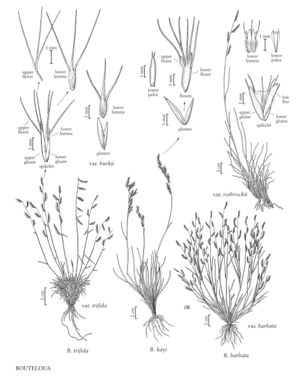Difference between revisions of "Bouteloua kayi"
imported>Volume Importer |
imported>Volume Importer |
||
| (One intermediate revision by the same user not shown) | |||
| Line 43: | Line 43: | ||
|publication year= | |publication year= | ||
|special status=Endemic | |special status=Endemic | ||
| − | |source xml=https:// | + | |source xml=https://bitbucket.org/aafc-mbb/fna-data-curation/src/200273ad09963decb8fc72550212de541d86569d/coarse_grained_fna_xml/V25/V25_892.xml |
|subfamily=Poaceae subfam. Chloridoideae | |subfamily=Poaceae subfam. Chloridoideae | ||
|tribe=Poaceae tribe Cynodonteae | |tribe=Poaceae tribe Cynodonteae | ||
Latest revision as of 17:59, 11 May 2021
Plants perennial; cespitose, without rhizomes or stolons. Culms 10-50 cm, erect; nodes glabrous; internodes glabrous, scabridulous between the veins. Leaves mostly basal; sheaths scabridulous or glabrous, sparsely pubescent basally; ligules 0.3-0.5 mm, membranous, ciliate; blades to 20 cm long, 0.5-1.5 mm wide, involute, scabridulous adaxially. Panicles 8-11 cm, with 7-20 branches; branches 15-30 mm, persistent, with (6)14-20 pedicellate spikelets, axes terminating in a spikelet; pedicels 0.6-0.8 mm; disarticulation above the glumes. Spikelets 6-8 mm, pectinate, with 1 bisexual and 1 rudimentary floret. Glumes subequal, 2.5-4 mm, glabrous, acute or bidentate, midvein sometimes excurrent as a mucro or short awn; lowest lemmas 5-7 mm, glabrous, 3-awned, awns 3-4 mm, central awns flanked by 2 membranous, acuminate, 0.4—0.6 mm lobes; lowest paleas sometimes reduced to 2 awns, awns 1-2 mm, anthers 1.2-1.3 mm, yellow; second florets glabrous, reduced to 1-3 awns, awns 3-4 mm. 2n = unknown.
Discussion
Bouteloua kayi is only known from the mountainous limestone terrain along the Rio Grande River in south-western Brewster County, Texas, at 2200-2500 m. Superficially, it resembles B. trifida.
Selected References
None.
